当前位置: Language Tips> 双语新闻
针对近期个别幼儿园被指存在“虐童”的情况,教育部23日晚回应表示,已责成地方有关部门立即启动调查,尽快查清事实真相。教育部已部署开展幼儿园办园行为专项督查。
儿童受到身体和心灵上双重伤害的事情的发生,不得不让家长警醒和反思。
今天一起来看看美国How To Tell Your Child机构制作的儿童防性侵视频,建议给4岁以上孩子观看,花7分钟让孩子远离伤害!
1 教孩子识别坏人
在短片的开始,老师就推翻了孩子们关于坏人的“想象”。她问孩子们:
How do you think you could figure if someone's bad?
你们认为,自己可以怎样识别出坏人?
对于坏人,每一个孩子都有自己的看法。
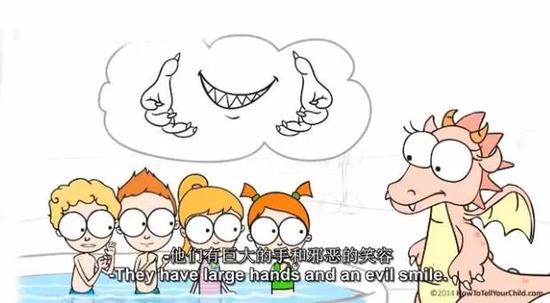
Oh, bad people had big teeth.
噢,坏人有大牙齿。
Oh, they had big red eyes.
噢,他们有大而血红的眼睛。
They have large hands and an evil smile.
他们有巨大的手和邪恶的笑容。
但老师否认了他们的这些天真的想法,并说,Bad people might not look bad.(坏人也许看上去并不坏),有时候看起来和其他人是一样的。
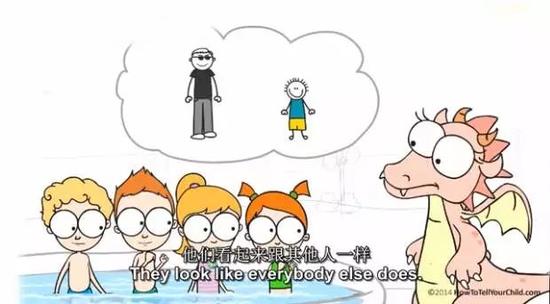
They can be nice looking, nice smiling and cool, too. They might even have a stash of yummy candies in their pockets.
他们也有可能是长得好看,有和蔼的微笑和炫酷的人,他们甚至在口袋里藏着美味的糖果。
要怎样教给我们的孩子去辨别坏人呢?老师先是告诉孩子们,对于男孩女孩来说,哪里是隐私部位。

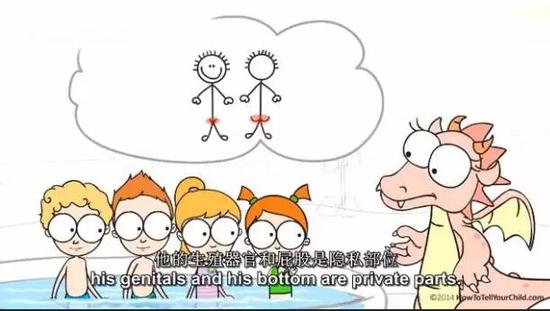
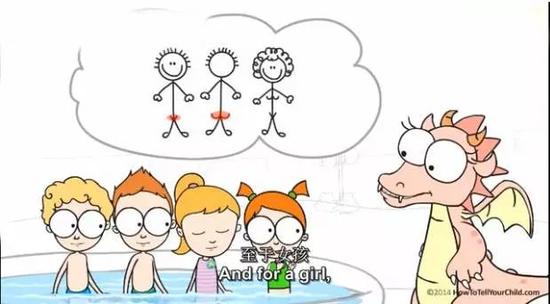
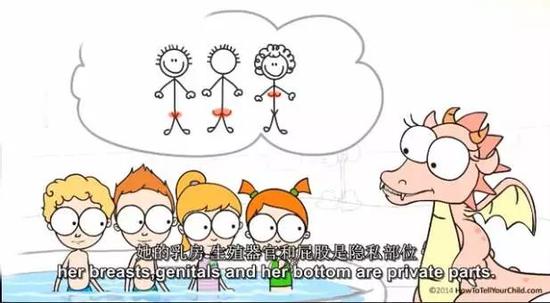
然后向孩子们解释说,隐私部位之所以叫做隐私部位,是因为它们不能在大众场合展示。 They are called private parts because they shouldn't be shown in public.
接下来要讲的五种报警,是整部短片的重中之重。这五个警报,不仅非常全面的概括到了各种危险的场景,也让孩子轻轻松松的就能够理解。
1 See Alert
视觉警报:
If someone sees your private parts, or makes you see someone else's private parts, it's called "See Alert".
如果有人看你的隐私部位,或者让你看其他人的隐私部位,这就叫做“视觉警报。”
2 Talk Alert
言语警报:
If someone talks about private parts, it's called "Talk Alert".
如果有人谈论隐私部位,这就叫做“言语警报。”
3 Touch Alert
触碰警报
If someone touches your private parts, or asks you to touch their private parts, it's called "Touch Alert".
如果有人触碰你的隐私部位,或者叫你触碰他们的隐私部位,这就叫做“触碰警报。”
4 Alone Alert
独处警报
Bad people can harm you only if you are alone with them. Remember never to accept goodies from strangers, especially when your parents aren't around.
坏人只有在你独自一人的时候才能伤害你。记住,千万不要接受陌生人给的好吃的。特别是父母不在身边时。
Being alone with a stranger is "Alone Alert".
倘若与陌生人单独待在一起,这就是“独处警报。”
5 Hold Alert
约束警报
You should not allow anyone to hug, carry or kiss you. If someone hugs, carries or kisses you, it's "Hold Alert".
你们不能允许任何人拥抱,背或者亲吻你们。如果有人拥抱,背或者亲吻你,这就是“约束警报。”
当然,在这五种警报以外,也有三种特殊情况:
没有人可以看隐私部位,谈论或是触碰隐私部位,但是“爸爸妈妈可以。”那也只能是在他们需要帮你清洗隐私部位或者你的隐私部位受伤的时候。
其他人只有在父母允许的情况下才可以,比如保姆帮助洗澡,或者在妈妈的陪伴下去看医生。
当孩子问及跟自己的姑妈拥抱,属不属于约束警报的时候,老师的建议真的是妙极了。
You should make your circle of love with your parents. Your circle of love will have people who could hold and love you.
你们可以与家长一起制作一个“爱心圈”,只有在这个圈子里的人,才是可以拥抱和疼爱孩子的人。
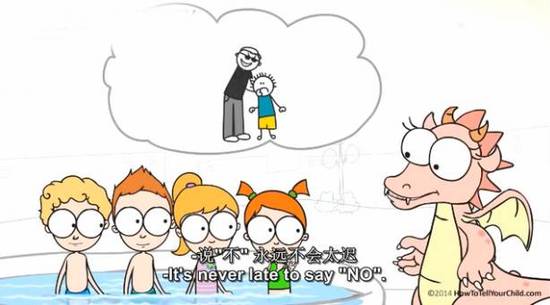
在短片的后半部分,老师给孩子们提出了10个问题,来考验孩子们听课以后,是不是真的把这些可能会遭遇到的危险“听进心里去了”。
一起来看看这段视频:
眼下已经不是那个“我们家孩子还小,不需要性教育”和“羞于跟孩子谈性”的社会了,我们是性教育缺失的一代,但我们的孩子需要“性教育”这重要的一课。一起来看看美国儿童心理研究所总结的让孩子远离侵害的十个办法。

1. Talk about body parts early.
1. 尽早谈论身体部位。
Name body parts and talk about them very early. Use proper names for body parts, or at least teach your child what the actual words are for their body parts. Feeling comfortable using these words and knowing what they mean can help a child talk clearly if something inappropriate has happened.
教孩子说身体部位的名字,尽早和孩子谈论身体部位。使用恰当的词汇描述身体部位,或者至少告诉孩子身体部位的实际词汇是什么。让孩子使用这些词汇时感觉不别扭,并知道其含义,这样在发生不恰当的行为时,孩子才能清楚地说出来。
2. Teach them that some body parts are private.
2. 告诉他们哪些是隐私部位。
Tell your child that their private parts are called private because they are not for everyone to see. Explain that mommy and daddy can see them naked, but people outside of the home should only see them with their clothes on. Explain how their doctor can see them without their clothes because mommy and daddy are there with them and the doctor is checking their body.
告诉孩子,隐私部位之所以称为隐私,是因为不能让其他人看见。向他们解释只有爸妈能看到,外人只能看到他们穿着衣服的样子。告诉孩子医生可以看到他们脱衣服的样子,因为爸妈也在场,医生是在检查身体。
3. Teach your child body boundaries.
3. 教会孩子区分身体边界。
Tell your child matter-of-factly that no one should touch their private parts and that no one should ask them to touch somebody else’s private parts. Parents will often forget the second part of this sentence. Sexual abuse often begins with the perpetrator asking the child to touch them or someone else.
实事求是地告诉孩子,没人可以触摸他们的隐私部位,也没人应该要求他们触摸其他人的隐私部位。家长经常忘记第二点。性侵犯经常以犯罪者要求孩子触摸自己或他人隐私部位的形式发生。
4. Tell your child that body secrets are not okay.
4. 告诉孩子不要隐瞒身体的秘密。
Most perpetrators will tell the child to keep the abuse a secret. This can be done in a friendly way, such as, “I love playing with you, but if you tell anyone else what we played they won’t let me come over again.” Or it can be a threat: “This is our secret. If you tell anyone I will tell them it was your idea and you will get in big trouble!” Tell your kids that no matter what anyone tells them, body secrets are not okay and they should always tell you if someone tries to make them keep a body secret.
大部分犯罪者会告诉孩子,保守性侵的秘密。他们可能以一种友好的方式说,“我喜欢和你玩儿,但如果你告诉其他人我们在玩儿什么,他们就不会再让我过来了。”也可能以威胁的口吻说:“这是我们之间的秘密。如果你让其他人知道,我会告诉他们这是你的主意,你就惹大麻烦了。”告诉孩子,不管其他人怎么和他们说的,都不要隐瞒身体的秘密,如果有人想让他们隐瞒身体的秘密,一定要告诉家长。
5. Tell your child that no one should take pictures of their private parts.
5. 告诉孩子不要让人拍摄隐私部位的照片。
This one is often missed by parents. There is a whole sick world out there of pedophiles who love to take and trade pictures of naked children online. This is an epidemic and it puts your child at risk. Tell your kids that no one should ever take pictures of their private parts.
家长经常忽略这一点。有些恋童癖者喜欢拍摄孩子的裸照,还会拿到网上去卖。这其实很普遍,让你的孩子身处危险之中。告诉孩子不要让其他人拍摄自己的隐私部位。
6. Teach your child how to get out of scary or uncomfortable situations.
6. 教会孩子如何远离让人恐惧或不舒服的环境。
Some children are uncomfortable with telling people “no”— especially older peers or adults. Tell them that it’s okay to tell an adult they have to leave, if something that feels wrong is happening, and help give them words to get out of uncomfortable situations. Tell your child that if someone wants to see or touch private parts they can tell them that they need to leave to go potty.
一些孩子不会拒绝,特别是对年长一些的孩子或者成年人。要让他们知道,如果感到不对劲,告诉一个成年人自己必须离开很正常,还要教会他们应该怎么说才能摆脱不舒服的环境。告诉孩子,如果有人要看或者触摸隐私部位,就和他们说需要去上个厕所。
7. Have a code word your children can use when they feel unsafe or want to be picked up.
7. 设定一个孩子感到不安全或想要被接走时所说的密码词汇。
As children get a little bit older, you can give them a code word that they can use when they are feeling unsafe. This can be used at home, when there are guests in the house or when they are on a play date or a sleepover.
随着孩子年龄的增长,可以给他们设定一个感到不安全时使用的密码词汇。家里有客人、出游、或者在朋友家留宿时都可以使用。
8. Tell your children they will never be in trouble if they tell you a body secret.
8. 告诉孩子,如果他们和你分享了一个身体秘密,绝不会遇到麻烦。
Tell your child that no matter what happens, when they tell you anything about body safety or body secrets they will NEVER get in trouble.
告诉孩子无论发生什么,他们告诉你有关身体安全或者身体秘密的任何事情都绝不会遇到麻烦。
9. Tell your child that a body touch might tickle or feel good.
9. 告诉孩子,不良的身体接触也可能感觉不错。
Many parents and books talk about “good touch and bad touch,” but this can be confusing because often these touches do not hurt or feel bad. I prefer the term “secret touch,” as it is a more accurate depiction of what might happen.
很多家长和书籍谈论“好的接触和坏的接触”,但这可能会让人困惑,因为这种接触经常不会造成伤害,也不会让人感到不舒服。我更倾向于使用“秘密接触”这种说法,这能更准确地描述发生了什么。
10. Tell your child that these rules apply even with people they know and even with another child.
10. 告诉孩子,即便对自己认识的人,甚至是其他孩子,这些规则也同样适用。
This is an important point to discuss with your child. When you ask a young child what a “bad guy” looks like they will most likely describe a cartoonish villain. You can say something like, “Mommy and daddy might touch your private parts when we are cleaning you or if you need cream — but no one else should touch you there. Not friends, not aunts or uncles, not teachers or coaches. Even if you like them or think they are in charge, they should still not touch your private parts.”
和孩子谈论这一点很重要。当你问幼儿坏人长啥样,他们很可能会描述一个卡通片里的大坏蛋。你可以这样和孩子说:“当你洗澡或者需要擦油时,爸爸妈妈可能会触摸你的隐私部位,但其他人不能这么做。朋友、阿姨、叔叔、老师、或者教练都不可以。即便你喜欢他们,或者认为他们管着你,他们也不能触摸你的隐私部位。”
来源:新华每日电讯、腾讯视频、美国儿童心理协会
翻译&编审:yaning
上一篇 : 这些“事实”老师都教错了
下一篇 :
关注和订阅

电话:8610-84883645
传真:8610-84883500
Email: languagetips@chinadaily.com.cn